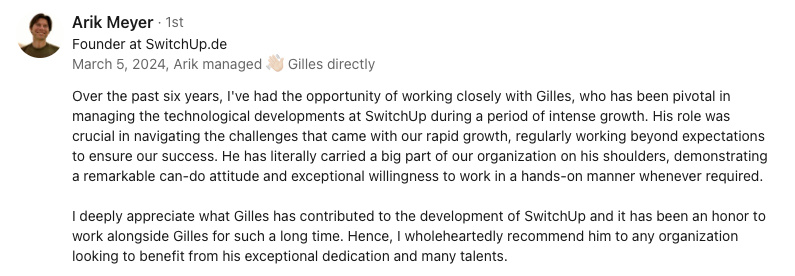Abstract:
The article underscores the critical importance of collaboration for startups in the cybersecurity sector, highlighting how partnerships with larger tech companies, government agencies, and specialized vendors can transform their approach to handling cyber threats. By leveraging advanced technologies and shared threat intelligence through these alliances, startups can overcome resource limitations, improve their defenses, and foster innovation. The narrative illustrates how strategic partnerships not only provide financial benefits by sharing costs but also facilitate continuous learning and compliance with complex regulations like GDPR and NIS2. Real-world examples, such as collaborations between IBM and McAfee, demonstrate the power of combined expertise in developing comprehensive security solutions. Moreover, the article emphasizes the role of public-private partnerships in sharing threat intelligence and developing standardized frameworks, which are crucial for navigating the evolving cybersecurity landscape. As the digital world and geopolitical dynamics shift, startups are encouraged to seize collaborative opportunities, such as participating in international consortia, to bolster their defenses and ensure sustainable growth.
Facing cyber threats can be overwhelming for startups with limited resources. Imagine a cybersecurity firm suddenly receiving advanced AI tech from a big tech company. This isn't just an upgrade; it's a shift that changes how they handle complex attacks.
Working together is more than just a trendy idea—it's crucial for startups trying to succeed in a competitive market. When they team up with established tech companies, government bodies, and niche vendors, these smaller firms can access tools and knowledge previously out of reach. This method isn't just budget-friendly; it sparks new ideas. When different skills and technologies mix, it can lead to groundbreaking cybersecurity solutions.
If you're in the cyber defense maze, understanding the importance of collaboration is key. It's not just about surviving; it's about using partnerships to grow and innovate while keeping security tight. Let's see how these alliances can turn potential weaknesses into strengths, leading the way to a safer digital world.
The power of collaboration in cyber defense
As cyber threats grow, especially from nation-states, startups face big challenges due to limited resources. Here, partnerships become essential. Startups can access top technologies and threat intelligence by teaming up with established tech firms. For instance, a small startup partnering with a tech giant to use advanced AI tools can dramatically improve its ability to spot and handle threats. These partnerships don't just bring tech advancements but also offer strategic insights usually unavailable to smaller players.
Collaborations aren't just a tech advantage; they make financial sense too. By sharing resources, startups can cut the costs of cybersecurity. It's like neighbors sharing a high-end security system instead of each getting their own. Through strategic partnerships, the financial burden of maintaining strong cybersecurity is shared, allowing startups to focus their budgets on innovation and growth, not just survival.
Moreover, the magic of partnerships lies in the innovation they spark. When startups combine their strengths with those of their partners, they can create new solutions neither could develop alone. Think of partnerships like IBM and McAfee, where shared expertise leads to comprehensive security solutions. Such collaborations encourage a blend of ideas and tech capabilities, leading to advancements that protect against more complex cyber threats.
Enhancing cybersecurity through shared knowledge
The strength of a partnership often comes from sharing knowledge. For startups, getting threat intelligence from partners can be a game-changer. Imagine having real-time updates on new threats from a global network—this boosts a startup's ability to quickly detect and respond to breaches.
Partnerships also promote constant learning and skill development. Instead of facing cybersecurity challenges alone, startups benefit from the collective expertise of their partners, much like an athlete learning from an experienced coach. This continuous learning ensures startups stay on the cutting edge of cybersecurity advancements, ready for new challenges.
I recall a time when our startup partnered with a global cybersecurity firm. The insights we gained from their threat intelligence network were invaluable. It was like having a seasoned mentor guiding us through the complex landscape of cyber threats. This partnership not only improved our immediate security posture but also helped us build a more robust long-term strategy.
Moreover, knowledge sharing in partnerships can simplify compliance with cybersecurity standards. By exchanging insights, startups can better understand and implement measures to meet complex regulatory requirements. Shared expertise ensures startups not only meet but often exceed standards set by regulations like GDPR or NIS2.
Navigating the EU regulations and geopolitical landscape
For tech startups, dealing with European regulations can feel like navigating a maze. These rules aren't just bureaucratic obstacles; they're vital for user protection and data integrity. Understanding and following these regulations is crucial for building trust with users and investors.
Understanding EU cybersecurity regulations
In European regulations, the General Data Protection Regulation (GDPR) is key. Its extensive data protection rules can be tough for startups with limited resources. Startups need to implement strong data protection measures or risk hefty fines that could threaten their business. Beyond GDPR, the NIS2 Directive adds complexity, requiring startups to enhance cybersecurity measures and report incidents.
Regulations like the Cybersecurity Act and the Digital Services Act (DSA) further impose compliance obligations on tech startups. The Cybersecurity Act encourages EU-wide cybersecurity certification, promoting trust and safety. Meanwhile, the DSA mandates transparency and accountability for digital service providers. Navigating these regulations is critical, and partnerships can greatly help.
Leveraging partnerships for regulatory compliance
For tech startups facing regulatory challenges, partnerships with legal and compliance experts are invaluable. These collaborations offer guidance, helping startups interpret complex regulations and implement necessary compliance measures.
In addition to legal support, partnerships with established cybersecurity firms are crucial. These firms offer advanced security technologies that help startups meet strict regulatory requirements like GDPR and NIS2. Aligning with such firms provides startups with the tools and expertise needed to strengthen their compliance frameworks.
Collaborations with industry consortia offer insights into evolving regulations and best practices. These partnerships ensure startups stay informed about changes, much like having a seasoned guide on a challenging hiking trail. By tapping into shared knowledge, startups can navigate regulatory requirements effectively.
Identifying key partners
Larger tech firms
Partnering with larger tech firms is an effective way for startups to strengthen cybersecurity. These giants have advanced technologies and extensive threat intelligence that enhance a startup's defenses. However, accessing these resources requires trust and mutual goals.
Government agencies
Government entities offer unique opportunities through public-private partnerships. These partnerships provide access to critical threat intelligence and support essential for identifying and mitigating cyber threats.
Cybersecurity vendors
Collaborating with specialized vendors is another strategic move. These vendors bring top-notch solutions, allowing startups to integrate advanced security into their operations.
Industry consortia
Industry consortia create platforms for collective threat intelligence sharing. By engaging with these groups, startups benefit from shared insights and collaborate on developing new defenses.
Roles of public-private partnerships
Sharing threat intelligence
Public-private partnerships are vital for sharing threat intelligence. Startups gain access to crucial information needed to prevent cyber threats, fostering a network that strengthens defenses.
Developing standards and frameworks
These partnerships aid in creating standardized cybersecurity frameworks. By collaborating on these frameworks, startups ensure consistent defense strategies, crucial for strong cybersecurity across sectors.
Innovation through joint R&D
Such partnerships often fund joint research and development of new cybersecurity solutions, pushing the boundaries of what's possible in cybersecurity tech.
Building and sustaining effective partnerships
Forming partnerships is crucial for startups to boost cybersecurity strategies. These collaborations provide access to resources and knowledge otherwise out of reach.
Strategies for identifying suitable partners
Startups should find partners whose capabilities complement their own, creating a synergy that strengthens defenses. Defining shared goals from the start ensures all parties work towards common objectives.
Networking plays a key role in identifying potential partners. Industry events and tech hubs are great places to discover partners with shared visions. Once partnerships are identified, the next step is maintaining them through trust and transparency.
Maintaining trust and transparency
Trust-based relationships are essential for successful partnerships, especially with sensitive data involved. Clear communication channels and roles maintain trust and transparency, ensuring expectations are met.
Regularly reviewing partnership agreements ensures objectives remain aligned. These reviews act as routine check-ups, ensuring smooth collaboration.
Real-world successes in cybersecurity partnerships
Collaborations with Larger Tech Firms: Some startups have transformed by leveraging advanced tools from bigger companies, significantly improving their ability to handle cybersecurity threats.
Government Partnerships: These provide critical threat intelligence and regulatory compliance support, helping startups anticipate threats and navigate complex regulations.
Partnerships with Specialized Vendors: These lead to innovative security solutions, integrating cutting-edge technologies into a startup's systems.
Lessons learned and best practices
Successful partnerships rely on understanding each partner's strengths and setting shared goals. Ongoing communication and trust-building are crucial, enabling partners to adapt to new challenges.
Startups should remain flexible and open to innovation within partnerships, quickly responding to emerging threats and seizing new opportunities.
Future trends and opportunities
As the digital world changes, so do the methods and actors in cyber warfare. Understanding these shifts is key for startups to find opportunities in collaborations.
Emerging trends in cyber warfare
AI plays a growing role in cyber warfare, offering both challenges and opportunities. Startups can use AI to develop tools that predict and neutralize threats in real-time.
Non-state actors are rising in the cyber threat landscape, requiring more diverse partnerships that ensure broad threat intelligence and response capabilities.
In Europe, geopolitical changes impact cybersecurity strategies. Startups must adapt, forming alliances resilient to future shifts.
Opportunities for collaborative initiatives
Startups can enhance defenses by joining international consortia, benefiting from shared threat intelligence and collaborative research. Public-private partnerships offer resources usually reserved for larger entities, leveling the playing field.
Collaborative initiatives within Europe help startups align with regional cybersecurity frameworks, ensuring secure and compliant operations. Embracing these opportunities strengthens security measures while fostering growth.
You might be interested by these articles:
- Cyber Resilience in the Age of AI Warfare
- Cybersecurity Threat Intelligence Trends
- Navigating the Cyber Warfare Landscape





